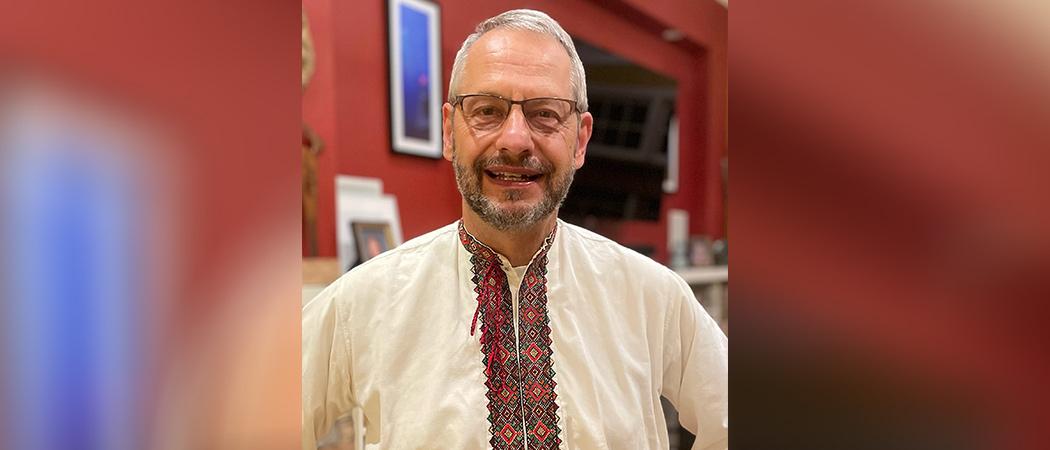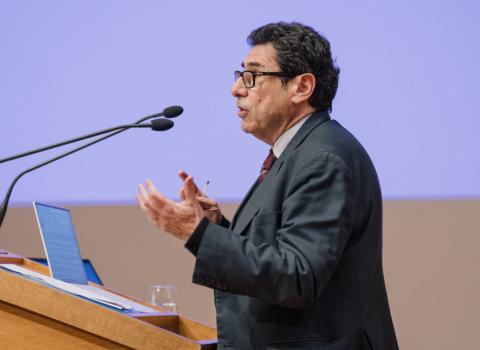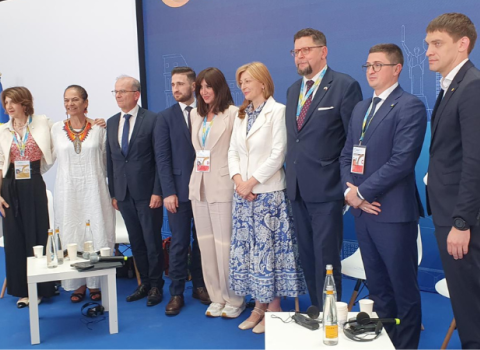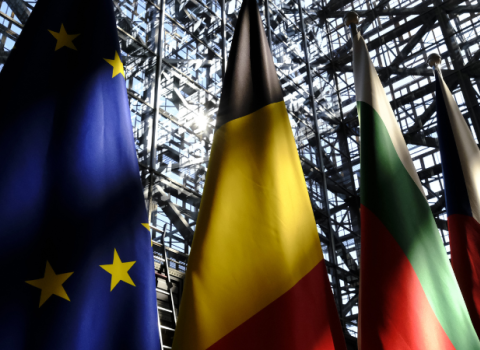Boris Lushniak, Obama-era health official and now a university dean, offers guidelines for academics debating if they should sever Russian scientific ties. The goal: get Russian scientists to ‘look at the facts’

Boris Lushniak, public-health dean at the University of Maryland and former acting US Surgeon General, in the blouse that his Ukrainian mother made while a refugee in a post-war German resettlement camp.
At a faculty meeting at the University of Maryland this week, Boris Lushniak literally wore his opinions on his sleeve.
He showed up in a white peasant blouse hand-made 75 years ago by his Ukrainian mother, then in a German resettlement camp after the last great European war. Today, Lushniak is public health dean at the university, and was formerly acting Surgeon General to President Obama. But Ukraine is a deeply personal matter to him – and so he would be expected to have some harsh views about dealing with Russia following the invasion.
Not quite, he says. For a scientist today, international relations are complicated. His first reaction to the war in Ukraine, Lushniak says, was “cut them off” by adding science to all the other sanctions imposed by the west, and end all scientific collaboration with Russia. But on further reflection, he arrived at a more nuanced position: do signal to Russian colleagues that what their government is doing is unconscionable, but don’t break off all professional relations with them.
“Individual connections between the scientists here and the scientists in Russia – those personal relationships need to be maintained. This is a lesson from Soviet times.” Then scientific contacts helped strengthen a resistance movement inside Russia. Though censorship has risen in Russia, “embedded in that society are people who do want to know the news from the west. I think complete stoppage (of relations) hurts the discourse, and if I just allow the scientists of Russia to be separated from us my fear is that it will regress even further.”
Instead, Lushniak says, “I want the scientists there to understand that it’s not business as usual.” They, as scientists, should “look at the data” to see what their government is doing and take action themselves. “I would love for the scientists of Russia to come out right now and make a statement. I’m not trying to turn them into me. They have their own people, their own language. But I want them to look at the facts.”
A global science debate
Lushniak’s views, as a Washington insider, reflect the kind of difficult self-examination going on throughout the western scientific world right now – and everybody’s coming up with different answers.
In Germany, the government and major scientific institutions were unequivocal last week: suspend all Russian collaborations. In Boston, MIT this weekend terminated its 11-year partnership in Skolkovo, the innovation hub near Moscow.
But at Ghent University in Belgium, the rector informed staff that he will not be ending a big Russian project. And elsewhere in the west, most university associations and administrators are hanging back, silently, as they consider the right moves.
To Lushniak, the right course involves acting on a clear set of guidelines, at least for now:
- Do not start any new research projects with Russian colleagues, but don’t end existing ones. Do continue to exchange scientific data as previously agreed, and do carry through on co-authorship agreements for scientific publication. Science, he says, is part of a process from idea to implementation. “I would not break obligations to scientific projects still going on. If I just cut off everything with Russia, then I don’t have that next phase of implementation” – of getting the Russian scientific community to step up to its own responsibilities.
2. Do end financial support to scientific conferences in Russia. Do not attend Russian conferences, and do not permit Russian scientists to join western conferences in person. Online participation is another matter, as everybody is now accustomed during the pandemic to digital meetings. But putting some limitations on scientific conferences will send a message to Russian colleagues, without totally ending contact.
3. Do continue working with Russian students and researchers already at western universities, but don’t invite new ones for now. “We should not initiate any new projects with Russia until this is settled, and we should not accept any new students and exchange students. But we should treat our Russian exchange students and scholars who are here with respect.”
Devil in the details
Those are Lushniak’s general precepts. But the details can get complicated. So, for instance, he doesn’t second-guess MIT’s decision to end its Skolkovo partnership, as he doesn’t know all the facts involved. Further, there might be an argument to start new COVID-19 research collaborations, but only if through international peer-review of the projects it’s certain that funds are going solely to that goal and not being diverted by the Russian government into other activities.
And the conference question is difficult, because such gatherings have become essential parts of the scientific enterprise. He points to an upcoming meeting of more than 10,000 dermatologists planned for Boston, which he says should now bar any Russian visitors who may have registered. And over the weekend, the International Congress of Mathematicians announced that their planned St. Petersburg meeting will move online-only, and won’t take any Russian funding.
But could these kinds of messy, case-by-case responses end up looking a bit weak? “People say this is purely symbolic. But guess what: I am so desperate that symbolism is important right now.”
“We need to maintain a civil connectivity with the Russians on the scientific front. But we also need to make a statement that scientists are part of this – that they need to look at the data of the current situation, and the unprovoked war by their nation into another sovereign and freedom-loving country,” Lushniak said.





 A unique international forum for public research organisations and companies to connect their external engagement with strategic interests around their R&D system.
A unique international forum for public research organisations and companies to connect their external engagement with strategic interests around their R&D system.